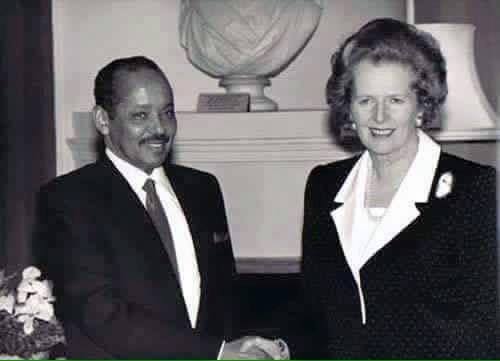OBIT: Gen. Mohamed Ali Samatar- A history of survival and firsts through the storms

General Mohamed Ali Samatar, Somalia’s first and only vice president bowed out Friday at the age of 81 in Virginia, US after a checkered career spanning a half a century which culminated into ascension to number two position in the land and senior most military man-Lieutenant General, a fete no other military officer has attained in Somalia’s history.
Born in 1935 in the coastal city of Kismayo, young Samatar joined the colonial police in 1950 shortly before he left for Italy to join Casano di Roma Infantry Academy where he learnt military craft between 1954 and 1956.
He returned to Somalia a time the build up to independence was almost at its peak and worked under the tutelage of a man who would until the end of his life in the public service be his boss- General Siad Barre. But Samatar was not to stay long at his post in Marka town when he was sent to Frunzi Academy in the then Soviet Socialist Republic, USSR, an elite institution reserved for the most qualified officers of the Warsaw Pact armies and their allies.
Military coup
In post-colonial Somalia, General Samatar joined Siad Barre’s government in 1971 which was then three years old after a military coup in 1969. Thanks to the close working relationship he had nurtured with Siad Barre during the colonial period, General Samatar would serve continuously as Defence Minister and Vice President from 1971 to 1981 surviving 11 cabinet reshuffles in between.
But tables turned against him in April 27, 1981, when Siad Barre launched a major shakeup of government officials dismissing four of his closest henchmen including Samatar. But the army man was to resume his position a year later. Samatar would serve as the country’s second senior most man until February 5, 1987 when a new portfolio was added to his office- he became the country’s fourth Prime Minister.
Many consider Samatar’s long survival especially in a military regime to his relationship with Siad Barre in the 1950s while others attribute it to his unequivocal loyalty to General Barre. However others read Siad Barre’s motive to maintain Samatar through the storms a tact to keep off the major clans from a possible threat. Samatar was from one of the smaller clans (Isse-Adde sub-clan).
Ogaden war
General Samatar led the Somali army during the Ogaden war (July 1977 to March 19780) against the Ethiopians over the disputed Ogaden region which to date lies within the Ethiopian territory.
In 2002, a group of Somalis in the US filed a civil law suit against Samatar over claims they had suffered physical abuse in violation of international law at the hands of soldiers or other government officials under his command.
Despite a request for termination of the case by former Prime Minister Abdi Farah Shirdon in 2013 to the US government, the US Supreme court upheld a federal court ruling which slapped Samatar with a $21 million in punitive and compensatory damages.
Samatar died in August 19, 2016 leaving behind children among them current Gender and Human Rights Development Minister Sahro Samatar and a host of grandchildren.